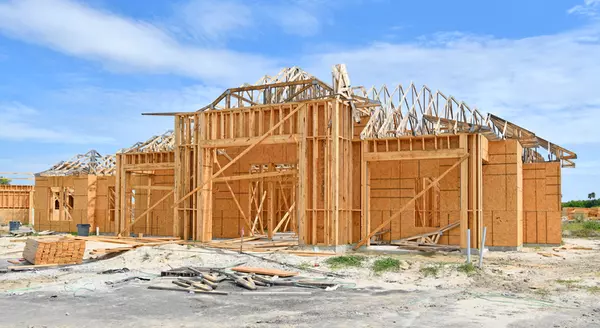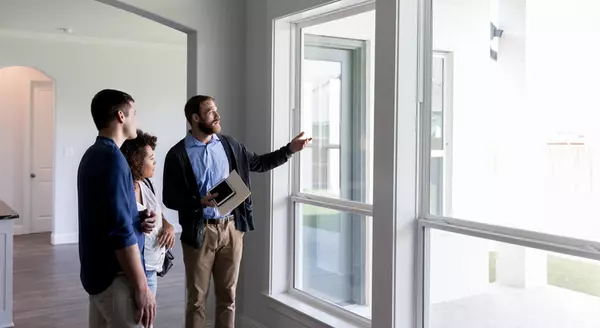Key Terms Every Homebuyer Should Learn [INFOGRAPHIC]
Some HighlightsBuying a home is a big deal and can feel especially complicated if you don't know the terms used during the process.If you want to become a homeowner this year, it's a good idea to learn these key housing terms and understand how they relate to the current housing market. That will help you feel confident when you buy a home. Connect with a local real estate agent so you can get expert help with any questions you have.
3 Key Factors Affecting Home Affordability
Over the past year, a lot of people have been talking about housing affordability and how tight it’s gotten. But just recently, there’s been a little bit of relief on that front. Mortgage rates have gone down since their most recent peak in October. But there’s more to being able to afford a home than just mortgage rates.To really understand home affordability, you need to look at the combination of three important factors: mortgage rates, home prices, and wages. Let’s dive into the latest data on each one to see why affordability is improving.1. Mortgage RatesMortgage rates have come down in recent months. And looking forward, most experts expect them to decline further over the course of the year. Jiayi Xu, an economist at Realtor.com, explains:“While there could be some fluctuations in the path forward … the general expectation is that mortgage rates will continue to trend downward, as long as the economy continues to see progress on inflation.”And even a small change in mortgage rates can have a big impact on your purchasing power, making it easier for you to afford the home you want by reducing your monthly mortgage payment.2. Home PricesThe second important factor is home prices. After going up at a relatively normal pace last year, they’re expected to continue rising moderately in 2024. That’s because even with inventory projected to grow slightly this year, there still aren’t enough homes for sale for all the people who want to buy them. According to Lisa Sturtevant, Chief Economist at Bright MLS:“More inventory will be generally offset by more buyers in the market. As a result, it is expected that, overall, the median home price in the U.S. will grow modestly . . .”That’s great news for you because it means prices aren’t likely to skyrocket like they did during the pandemic. But it also means it’ll probably cost you more to wait. So, if you’re ready, willing, and able to buy, and you can find the right home, purchasing before more buyers enter the market and prices rise further might be in your best interest.3. WagesAnother positive factor in affordability right now is rising income. The graph below uses data from the Federal Reserve to show how wages have grown over time: If you look at the blue dotted trendline, you can see the rate at which wages typically rise. But on the right side of the graph, wages are above the trend line today, meaning they’re going up at a higher rate than normal.Higher wages improve affordability because they reduce the percentage of your income it takes to pay your mortgage. That’s because you don’t have to put as much of your paycheck toward your monthly housing cost.What This Means for YouHome affordability depends on three things: mortgage rates, home prices, and wages. The good news is, they’re moving in a positive direction for buyers overall.Bottom LineIf you're thinking about buying a home, it's important to know the main factors impacting affordability are improving. To get the latest updates on each, connect with a trusted real estate agent.
2 Reasons Why Today’s Mortgage Rate Trend Is Good for Sellers
If you’ve been holding off on selling your house to make a move because you felt mortgage rates were too high, their recent downward trend is exciting news for you. Mortgage rates have descended since last October when they hit 7.79%. In fact, they’ve been below 7% for over a month now (see graph below):And while they’re not going back to the 3% we saw during the ‘unicorn’ years, they are expected to continue to go down from where they are now in the near future. As Dean Baker, Senior Economist at the Center for Economic Research, explains:“It also appears that mortgage rates are now falling again. They will almost certainly not fall to pandemic lows, although we may soon see rates under 6.0 percent, which would be low by pre-Great Recession standards.”Here are two reasons why this recent trend, and the expectation it’ll continue, is such good news for you.You May Not Feel as Locked-In to Your Current Mortgage RateWith mortgage rates already significantly lower than they were just a few months ago, you may feel less locked-in to the current mortgage rate you have on your house. When mortgage rates were higher, moving to a new home meant possibly trading in a low rate for one up near 8%.However, with rates dropping, the difference between your current mortgage rate and the new rate you’d be taking on isn’t as big as it was. That makes moving more affordable than it was just a few months ago. As Lance Lambert, Founder of ResiClub, explains:“We might be at peak “lock-in effect.” Some move-up or lifestyle sellers might be coming to terms with the fact 3% and 4% mortgage rates aren’t returning anytime soon.”More Buyers Will Be Coming to the MarketAccording to data from Bright MLS, the top reason buyers have been waiting to take the plunge into homeownership is high mortgage rates (see graph below):Lower mortgage rates mean buyers can potentially save money on their home loans, making the prospect of purchasing a home more attractive and affordable. Now that rates are easing, more buyers are likely to feel they’re ready to jump back into the market and make their move. And more buyers mean more demand for your house.Bottom LineIf you’ve been waiting to sell because you didn’t want to take on a larger mortgage rate or you thought buyers weren’t out there, the recent decline in mortgage rates may be your sign it’s time to make your move. When you’re ready, connect with a local real estate agent.
Why You May Want To Seriously Consider a Newly Built Home
Are you putting off your plans to sell because you’re worried you won’t be able to find a home you like when you move? If so, it may be time to consider a newly built home and the benefits that come with one. Here’s why.Near-Record Percentage of New Home InventoryNewly built homes are becoming an increasingly significant part of today’s housing inventory. According to the most recent report from the National Association of Home Builders (NAHB):“Newly built homes available for sale accounted for 31% of total homes available for sale in November, compared to an approximate 12% historical average.”That means the percentage of the total homes available to buy that are newly built is well over two times higher than the norm. And even more new homes are on the way. Recent data from the Census shows there’s been an uptick in both housing starts (where builders break ground on more new homes) and housing completions (homes where construction just wrapped). And while some people may worry builders are building too many homes, that isn’t a concern – if anything, the recent increase is really good news. As Lawrence Yun, Chief Economist at the National Association of Realtors (NAR), explains:“Even more home building will be needed with the housing shortage persisting in most markets . . . Another 30% rise in home construction can easily be absorbed in the marketplace . . .”How This Helps You Since the supply of existing homes for sale is still low right now, the increase of new-home construction can be a game changer because it gives you more options for your search. Picture yourself in a home that’s new from the ground up: new appliances, fresh paint, fewer maintenance needs because everything is new, and so much more. Doesn’t that sound nice? And it may be more within reach than you ever imagined. In addition, some builders are offering things like mortgage rate buy-downs for homebuyers right now. This can help offset today’s affordability challenges while also getting you into your dream home. In a recent article, Patrick Duffy, Senior Real Estate Economist at U.S. News, explains:“Builders have been using mortgage interest rate buydowns for many years as a sales incentive whenever interest rates are relatively high, . . .Today more builders are offering rate buydowns for the entirety of the loan, allowing buyers to finance more home for the same payment amount.”Just remember, the process of buying from a builder is different from buying from a home seller, so it’s important to partner with a trusted real estate agent who knows the local market. They’ll be your go-to resource for coordinating with the builder, reviewing contracts, and more.Bottom LineIf you’re trying to sell so you can make a move but you’re having a hard time finding a home you like, connect with a local real estate agent to explore all of your options, including the newly built homes in our area.
Homeownership Is Still at the Heart of the American Dream
Buying a home is a powerful decision, and it remains at the heart of the American Dream. Unlike renting, owning a home means more than just having a place to live – it offers a sense of belonging, stability, and freedom. According to Nicole Bachaud, Senior Economist at Zillow:“The American Dream is still owning a home. There’s a lot of pent-up demand for ownership; that isn’t going to go away.”Let’s explore just a few of the reasons why so many Americans continue to value homeownership. The Financial Benefits of Owning a HomeOne possible reason homeownership is viewed so highly is because owning a home is a significant wealth-building tool. That may be why Jessica Lautz, Deputy Chief and VP of Research at the National Association of Realtors (NAR), says:“Homeownership is the number one way to build wealth in America.”Over time, owning a home not only helps boost your own net worth, but it also sets future generations up for success as you pass that wealth down. Habitat for Humanity explains: “Overall, homeownership promotes wealth building by acting as a forced savings mechanism and through home value appreciation. Homeowners make monthly payments that increase their equity in their homes by paying down the principal balance of their mortgage. . . . In addition, owning a home promotes intergenerational homeownership and wealth building. Children of homeowners transition to homeownership earlier — lengthening the period over which they can accumulate wealth . . .”It can also provide meaningful financial stability compared to renting. When you buy with a fixed-rate mortgage, you can lock in your monthly housing payments for the length of your home loan.The Non-Financial Benefits of HomeownershipBut, owning a home offers more than just financial benefits—it benefits you socially and emotionally too. Your home provides feelings of achievement, responsibility, and more. In a recent survey, Fannie Mae outlines just a few of these more emotionally-driven benefits, including:“The top three were having control over what you do with your living space (94%) to having a sense of privacy and security (91%) and having a good place for your family or to raise your children (90%) . . .”What Does That Mean for You?If your idea of the American Dream involves greater freedom, security, and prosperity, homeownership could be a key player in bringing that dream to life. And with mortgage rates now on a downward trend, it might be a good time for you to consider making a move.If you’re ready and able to buy, know that there are incredible benefits waiting at the end of your journey. You'll gain more than just a home – it's a place to grow your wealth and call your very own. Like Ksenia Potapov, Economist at First American says:“...homeownership remains an important driver of wealth accumulation and the largest source of total wealth among most households.”Bottom LineBuying a home is a powerful decision and the cornerstone of the American Dream. If finding a place to call your own is part of your dream for this year, connect with a local real estate advisor to start the process today.
Home Prices Forecast To Climb over the Next 5 Years [INFOGRAPHIC]
Some HighlightsIf you’re worried about what’s next for home prices, know the HPES shows experts are projecting they’ll continue to rise at least through 2028.Based on that forecast, if you bought a $400,000 house this year, experts say it could gain over $72,000 in equity over the next five years. If you're worried about falling home prices, don't be. Many experts forecast they'll keep rising for years to come. If you have questions, ask a local real estate agent.
The Dramatic Impact of Homeownership on Net Worth
If you're trying to decide whether to rent or buy a home this year, here's a powerful insight that could give you the clarity and confidence you need to make your decision.Every three years, the Federal Reserve releases the Survey of Consumer Finances (SCF), which compares net worth for homeowners and renters. The latest report shows the average homeowner’s net worth is almost 40X greater than a renter’s (see graph below):One reason a wealth gap exists between renters and homeowners is because when you’re a homeowner, your equity grows as your home appreciates in value and you make your mortgage payment each month. When you own a home, your monthly mortgage payment acts like a form of forced savings, which eventually pays off when you decide to sell. As a renter, you’ll never see a financial return on the money you pay out in rent every month. Ksenia Potapov, Economist at First American, explains it like this:“Renters don’t capture the wealth generated by house price appreciation, nor do they benefit from the equity gains generated by monthly mortgage payments . . .”The Largest Part of Most Homeowner Net Worth Is Their EquityHome equity does more to build the average household’s wealth than anything else. According to data from First American and the Federal Reserve, this holds true across different income levels (see graph below):The green segment in each bar represents how much of a homeowner's net worth comes from their home equity. Based on this data, it's clear no matter what your income level is, owning a home can really boost your wealth. Nicole Bachaud, Senior Economist at Zillow, shares:“The biggest asset most people are ever going to own is a home. Homeownership is really that financial key that helps unlock stability and wealth preservation across generations.”If you’re ready to start building your net worth, the current real estate market offers several opportunities you should consider. For example, with mortgage rates trending lower lately, your purchasing power may be higher now than it has been in months. And, with more inventory coming to the market, there are more options for you to consider. A local real estate agent can walk you through the opportunities you have today and guide you through the process of finding your ideal home.Bottom LineIf you're unsure about whether to rent or buy a home, keep in mind that owning a home can increase your overall wealth in the long run, no matter your income. To discover more about this and the many other benefits of homeownership, connect with a local real estate agent.
Buy your baby a house!
As parents, we always want the best for our children. We tirelessly work towards providing them with a bright future and endless opportunities. One way to secure their future is by investing in real estate. Yes, you read that right – it's time to consider buying your baby a house!When it comes to planning for your child's future, many parents turn to 529 savings plans. While these plans have their merits, investing in a house can offer unique advantages. Unlike a 529, a house is a tangible asset that can appreciate in value over time. By purchasing a property in a desirable location, you can potentially benefit from both a growing market and rental income.Investing in real estate can provide families with an additional source of income – residual income. By purchasing a property and renting it out, you can generate passive income on a monthly basis. This residual income can be a fantastic way to fund your child's education or contribute to other expenses that arise throughout their lives.Moreover, purchasing a house for your baby can also help build equity. Instead of spending money on rent, you can invest in a property that will appreciate over time. As your child grows, so will the value of the property. This equity can be used to fund their college education or act as a safety net later in life.Speaking of college, buying a house for your baby can have direct benefits when it comes time for them to pursue higher education. Rather than worrying about expensive dorm fees or rental costs, your child can live in the property you purchased. This not only saves money but also provides a secure and comfortable living space throughout their college years.In conclusion, while 529 plans have their advantages, investing in real estate can offer unique benefits for your child's future. From residual income and equity building to providing a secure living space for college, buying a house for your baby can be a wise decision. So, instead of just saving for your child's future, consider investing in it by purchasing a property that can potentially grow in value over time. Start planning today and give your baby the gift of financial security and opportunity!
Avoid These Common Mistakes After Applying for a Mortgage
If you’re getting ready to buy a home, it’s exciting to jump a few steps ahead and think about moving in and making it your own. But before you get too far down the emotional path, there are some key things to keep in mind after you apply for your mortgage and before you close. Here’s a list of things to remember when you apply for your home loan.Don’t Deposit Large Sums of CashLenders need to source your money, and cash isn’t easily traceable. Before you deposit any cash into your accounts, discuss the proper way to document your transactions with your loan officer.Don’t Make Any Large PurchasesIt’s not just home-related purchases that could disqualify you from your loan. Any large purchases can be red flags for lenders. People with new debt have higher debt-to-income ratios (how much debt you have compared to your monthly income). Since higher ratios make for riskier loans, borrowers may no longer qualify for their mortgage. Resist the temptation to make any large purchases, even for furniture or appliances.Don’t Cosign Loans for AnyoneWhen you cosign for a loan, you’re making yourself accountable for that loan’s success and repayment. With that obligation comes higher debt-to-income ratios as well. Even if you promise you won’t be the one making the payments, your lender will have to count them against you.Don’t Switch Bank AccountsLenders need to source and track your assets. That task is much easier when there’s consistency among your accounts. Before you transfer any money, speak with your loan officer.Don’t Apply for New CreditIt doesn’t matter whether it’s a new credit card or a new car. When your credit report is run by organizations in multiple financial channels (mortgage, credit card, auto, etc.), it will have an impact on your FICO® score. Lower credit scores can determine your interest rate and possibly even your eligibility for approval.Don’t Close Any AccountsMany buyers believe having less available credit makes them less risky and more likely to be approved. This isn’t true. A major component of your score is your length and depth of credit history (as opposed to just your payment history) and your total usage of credit as a percentage of available credit. Closing accounts has a negative impact on both of those parts of your score.Do Discuss Changes with Your LenderBe upfront about any changes that occur or you’re expecting to occur when talking with your lender. Blips in income, assets, or credit should be reviewed and executed in a way that ensures your home loan can still be approved. If your job or employment status has changed recently, share that with your lender as well. Ultimately, it’s best to fully disclose and discuss your intentions with your loan officer before you do anything financial in nature.Bottom LineYou want your home purchase to go as smoothly as possible. Remember, before you make any large purchases, move your money around, or make major life changes, be sure to consult your lender – someone who’s qualified to explain how your financial decisions may impact your home loan.
Ways Your Home Equity Can Help You Reach Your Goals
If you’ve owned your house for at least a couple of years, there’s something you’re going to want to know more about – and that’s home equity. If you’re not familiar with that term, Freddie Mac defines it like this:“. . . your home’s equity is the difference between how much your home is worth and how much you owe on your mortgage.”That means your equity grows as you pay down your home loan over time and as home values climb. While it’s true home prices dipped slightly last year, they rebounded and have been climbing in many areas since then. Here’s why that price growth is good news for you.In the latest Equity Insights Report, Selma Hepp, Chief Economist at CoreLogic, explains:“With price gains continuing to help homeowners build wealth, equity has reached a new high and regained losses that resulted from declines last year. And while the average U.S. homeowner gained over $20,000 in additional equity compared with the third quarter of 2022, some markets are seeing larger increases as price growth catches up.” And that figure is just for the last year. To help you really understand how that number can add up over time, the report also says the average homeowner with a mortgage has more than $300,000 in equity. That much equity can have a big impact.Here are a few examples of how you can put your home equity to work for you.1. Buy a Home That Fits Your NeedsIf your current space no longer meets your needs, it might be time to think about moving to a bigger home. And if you’ve got too much space, downsizing to a smaller one could be just right. Either way, you can put your equity toward a down payment on something that fits your changing lifestyle.2. Reinvest in Your Current HomeAnd, if you’re not ready to move just yet, you can use the equity you have to improve your current home. But it’s important to consider the long-term benefits certain upgrades can bring to your home’s value. A real estate agent is a great resource on which projects to prioritize to get the greatest return on your investment when you sell later on.3. Pursue Personal AmbitionsHome equity can also serve as a catalyst for realizing your life-long dreams. That could mean investing in a new business venture, retirement, or funding an education. While you shouldn’t use your equity for unnecessary spending, using it responsibly for something meaningful and impactful can really make a difference in your life.4. Understand Your Options to Avoid ForeclosureWhile the number of foreclosure filings remains below the norm, there are still some homeowners who go into foreclosure each year. If you’re in a tough spot financially, having a clear understanding of your options can help. Equity can act as a cushion if you’re not able to make your mortgage payments on time.Bottom LineIf you want to know how much equity you have in your home, connect with a local real estate agent. They can do a professional equity assessment report on how much you’ve built up over time and talk you through how you can use it to help you reach your goals.
What Lower Mortgage Rates Mean for Your Purchasing Power
If you want to buy a home, it's important to know how mortgage rates impact what you can afford and how much you’ll pay each month. Fortunately, rates for 30-year fixed mortgages have come down significantly since the end of October and are currently under 7%, according to Freddie Mac (see graph below): This recent trend is great news for buyers. As a recent article from Bankrate says:“The rate cool-off somewhat eases the housing affordability squeeze.”And according to Edward Seiler, AVP of Housing Economics and Executive Director of the Research Institute for Housing America at the Mortgage Bankers Association (MBA):“MBA expects that affordability conditions will continue to improve as mortgage rates decline . . .”Here’s a bit more context on how this could help with your plans to buy a home.How Mortgage Rates Affect Your Search for a HomeUnderstanding the connection between mortgage rates and your monthly home payment is crucial for your plans to become a homeowner. The chart below illustrates how your ability to afford a home changes when mortgage rates shift. Imagine your budget allows for a monthly payment between $2,400 and $2,500. The green part in the chart shows payments in that range or lower (see chart below): As you can see, even small changes in rates can affect your budget and the loan amount you can afford.Get Help from Reliable Experts To Understand Your Budget and Plan AheadWhen you're looking to buy a home, it's important to get guidance from a local real estate agent and a trusted lender. They can help you explore different mortgage options, understand what makes mortgage rates go up or down, and how those changes impact you.By looking at the numbers and the latest data together, then adjusting your strategy based on today's rates, you'll be better prepared and ready to buy a home.Bottom LineIf you’re looking to buy a home, you should know the recent downward trend in mortgage rates is good news for your move. Team up with a trusted real estate agent and lender to plan your next steps.
Achieving Your Homebuying Dreams in 2024 [INFOGRAPHIC]
Some HighlightsPlanning to buy a home in 2024? Here’s what to focus on.Improve your credit score, plan for your down payment, get pre-approved, and decide what’s most important to you.Partner with a trusted real estate agent so you have expert advice on how to achieve your homebuying goals this year.
Why Pre-Approval Is Your Homebuying Game Changer
If you’re thinking about buying a home, pre-approval is a crucial part of the process you definitely don’t want to skip. So, before you start picturing yourself in your new living room or dining on your future all-season patio, be sure you’re working with a trusted lender to prioritize this essential step. Here’s why.While home price growth is moderating and mortgage rates have been coming down in recent weeks, affordability is still tight. At the same time, there’s a limited number of homes for sale right now, and that means ongoing competition among hopeful buyers. But, if you’re strategic, there are ways to navigate these waters – and pre-approval is the game changer.What Pre-Approval Does for YouTo understand why it’s such an important step, you need to know more about pre-approval. As part of the homebuying process, a lender looks at your finances to determine what they’re willing to loan you. From there, your lender will give you a pre-approval letter to help you understand how much money you can borrow. Freddie Mac explains it like this:“A pre-approval is an indication from your lender that they are willing to lend you a certain amount of money to buy your future home. . . . Keep in mind that the loan amount in the pre-approval letter is the lender’s maximum offer. Ultimately, you should only borrow an amount you are comfortable repaying.”Getting pre-approved starts to put you in the mindset of seeing the bigger financial picture, one step at a time. And the key is actually more than just getting a pre-approval letter from your lender. The combination of pre-approval and strategic budgeting is your golden ticket to understanding what you can actually afford. It saves you from painful heartaches down the road so you don’t fall in love with a house that might be out of reach.Pre-Approval Helps Show Sellers You’re a Serious BuyerBut that's just the beginning. Let’s face it, there are more people looking to buy than there are homes available for sale, and that creates competition among homebuyers. That means you could see yourself in a multiple-offer scenario when you get ready to make your move. But getting pre-approved for a mortgage can help you stand out from other buyers.In today's fast-moving housing market, having that pre-approval in your back pocket can be your secret weapon. When sellers see you're pre-approved, it tells them you're a strategic and serious buyer. In a world of multiple offers, that's a big deal. As an article from the Wall Street Journal (WSJ) says:“If you plan to use a mortgage for your home purchase, preapproval should be among the first steps in your search process. Not only can getting preapproved help you zero in on the right price range, but it can give you a leg up on other buyers, too.”Pre-approval shows sellers you’re more than just a window shopper. You’re a buyer who’s already undergone a credit and financial check, making it more likely that the sale will move forward without unexpected delays or issues. Sellers love that because they see your offer as a reliable one. A win-win, right?Bottom LineSo, before you start mentally arranging furniture in your dream home, let’s connect to get your pre-approval set. It’ll save you time, stress, and a lot of headaches that could come up along the way without it. The reality is, the more prepared you are, the more likely you are to land the home you’re longing for.
Thinking About Buying a Home? Ask Yourself These Questions
If you’re thinking of buying a home this year, you’re probably paying closer attention than normal to the housing market. And you’re getting your information from a variety of channels: the news, social media, your real estate agent, conversations with friends and loved ones, the list goes on and on. Most likely, home prices and mortgage rates are coming up a lot.Here are the top two questions you need to ask yourself as you make your decision, including the data that helps cut through the noise.1. Where Do I Think Home Prices Are Heading? One reliable place you can turn to for information on home price forecasts is the Home Price Expectations Survey from Fannie Mae – a survey of over one hundred economists, real estate experts, and investment and market strategists.According to the most recent release, the experts are projecting home prices will continue to rise at least through 2028 (see the graph below):So, why does this matter to you? While the percent of appreciation may not be as high as it was in recent years, what’s important to focus on is that this survey says we’ll see prices rise, not fall, for at least the next 5 years.And home prices rising, even at a more moderate pace, is good news not just for the market, but for you too. It means, by buying now, your home will likely grow in value, and you should gain home equity in the years ahead. But, if you wait, based on these forecasts, the home will only cost you more later on. 2. Where Do I Think Mortgage Rates Are Heading?Over the past year, mortgage rates spiked up in response to economic uncertainty, inflation, and more. But there’s an encouraging sign for the market and mortgage rates. Inflation is moderating, and here’s why this is such a big deal if you’re looking to buy a home.When inflation cools, mortgage rates generally fall in response. That’s exactly what we’ve seen in recent weeks. And, now that the Federal Reserve has signaled they’re pausing their Federal Funds Rate increases and may even cut rates in 2024, experts are even more confident we’ll see mortgage rates come down.Danielle Hale, Chief Economist at Realtor.com, explains:“. . . mortgage rates will continue to ease in 2024 as inflation improves and Fed rate cuts get closer. . . . a key factor in starting to provide affordability relief to homebuyers.”As an article from the National Association of Realtors (NAR) says:“Mortgage rates likely have peaked and are now falling from their recent high of nearly 8%. . . . This likely will improve housing affordability and entice more home buyers to return to the market . . .” No one can say with absolute certainty where mortgage rates will go from here. But the recent decline and the latest decision from the Federal Reserve to stop their rate increases, signals there’s hope on the horizon. While we may see some volatility here and there, affordability should improve as rates continue to ease. Bottom LineIf you’re thinking about buying a home, you need to know what’s expected with home prices and mortgage rates. While no one can say for certain where they’ll go, making sure you have the latest information can help you make an informed decision. Connect with a trusted local real estate agent so you can stay up to date on what’s happening and why this is such good news for you.
Things To Consider If Your House Didn’t Sell
If your listing has expired and your house didn’t sell, it's completely normal to feel a mix of frustration and disappointment. Understandably, you're probably wondering what may have gone wrong. Here are three questions to think about as you figure out what to do next.Did You Limit Access to Your House?One of the biggest mistakes you can make when selling your house is restricting the days and times when potential buyers can tour it. Being flexible with your schedule is important, even though it might feel a bit stressful to drop everything and leave when buyers want to see it. After all, minimal access means minimal exposure to buyers. ShowingTime advises:“. . . do your best to be as flexible as possible when granting access to your house for showings.”Sometimes, the most determined buyers might come from far away. Since they’re traveling to see your house, they may not be able to change their plans easily if you only offer limited times for showings. So, try to make your house available as much as you can to accommodate them. It's simple – if no one’s able to look at it, how will it sell?Did You Make Your House Stand Out?When you're selling your house, the old saying matters: you never get a second chance to make a first impression. Putting in the work to make the exterior of your home look nice is just as important as how you stage it inside. Freshen up your landscaping to boost your home’s curb appeal so you can make an impact upfront. As an article from U.S. News says:“After all, if people drive by, but aren’t interested enough to walk through the front door, you’ll never sell your house.”But don’t let that impact stop at the front door. By removing personal items and reducing clutter inside, you give buyers more freedom to picture themselves in the home. Plus, a fresh coat of paint or thorough floor cleaning can work wonders in sprucing up the house for potential buyers.Did You Price Your House at Market Value?Setting the right price is key. While it might be tempting to push the price higher to maximize your profit, overpricing your house can actually turn off potential buyers and slow down the selling process. Forbes notes:“Pricing a home too high could lead to a slower sale or force the seller to drop their price.”If your house is priced higher than others like it, it may discourage buyers, resulting in increased time on the market. Pay attention to the feedback people give your agent during open houses and showings. If lots of people are saying the same thing, it might be a good idea to think about lowering the price.For all these insights and more, rely on a trusted real estate agent. A great agent will offer expert advice on relisting your house with effective strategies to get it sold.Bottom LineIt’s natural to feel disappointed when your listing has expired and your house didn’t sell. Connect with a reliable real estate agent to determine what happened, and what changes you should make to get your house back on the market.
Interest Rates Are Dropping!
And we are off! With the recent, and forthcoming, slight drop in interest rates we have immediatley seen buyers and sellers rush back into the market. When will you join in?
For buyers, this drop in interest rates means that obtaining a mortgage will be more affordable. Lower interest rates translate into lower monthly mortgage payments, allowing buyers to potentially afford a larger and more desirable home. In addition, the drop in interest rates may also increase buyers' purchasing power, enabling them to negotiate better deals and secure their dream homes at a more favorable cost.
For sellers, the decrease in interest rates means an increase in potential buyers. Lower interest rates make homeownership more affordable, attracting more people to enter the market. This surge in buyer activity can result in quicker sales and potentially even multiple offers. Sellers can take advantage of this increased demand by listing their homes at competitive prices and potentially fetching higher profits.
However, it's important for both buyers and sellers to act swiftly. Interest rates fluctuate and can change rapidly. While rates are currently dropping, they might rise again in the future. Therefore, it is crucial to strike now while the iron is hot. Buyers should take advantage of the lower interest rates to secure their dream homes, and sellers should list their properties to capitalize on the increased buyer activity.
To take advantage of the current market conditions, buyers should start by getting pre-approved for a mortgage. This will allow them to know exactly how much home they can afford based on the reduced interest rates. With this knowledge in hand, buyers can confidently search for their ideal property and make competitive offers.
Sellers, on the other hand, should take this opportunity to prepare their homes for sale. This includes enhancing curb appeal, decluttering, and staging the property to attract potential buyers. By being proactive and getting their homes market-ready, sellers can ensure they are in the best position to sell quickly and at a favorable price.
In conclusion, the recent drop in interest rates is excellent news for both buyers and sellers in the real estate market. Buyers can secure more affordable mortgages, and sellers can enjoy increased buyer activity. However, time is of the essence, and those interested in taking advantage of these favorable conditions should act promptly. Don't wait – get out there and make your mark in the thriving real estate market today!
New Year's Resolutions
As we step into a new year, many of us feel motivated to set goals and make resolutions. However, history has shown that most New Year's resolutions tend to fall by the wayside within a few weeks. So, instead of making the same old promises to ourselves, let's focus on resolutions that actually work and can have a positive impact on our lives.First and foremost, let's ditch the idea of making New Year's resolutions altogether. Instead, let's embrace a lifestyle of continuous improvement. By adopting this mindset, we can set goals and make positive changes throughout the year, rather than confining them to just one time of the year.When setting goals, it is crucial to be specific and realistic. Instead of aiming to "exercise more," set a specific target, such as "exercise for 30 minutes, five times a week." By setting clear objectives, you are more likely to stay committed and achieve your goals.Another important aspect of goal setting is to break them down into smaller, actionable steps. This allows you to track your progress and stay motivated. For instance, if your goal is to save up for a down payment on a new home, break it down into smaller milestones, such as saving a certain amount each month.It's also essential to hold yourself accountable. Share your goals with a trusted friend or family member who can provide support and help keep you on track. Additionally, consider using technology to your advantage. There are numerous apps available that can help you track your progress, set reminders, and provide extra motivation.Lastly, don't forget to celebrate your achievements along the way. Rewarding yourself for reaching milestones can boost your motivation and make the journey more enjoyable. Treat yourself to a small indulgence or take a well-deserved break to recharge.In conclusion, let's move away from the traditional notion of New Year's resolutions and focus on making lasting changes throughout the year. By setting realistic goals, breaking them down into actionable steps, seeking support, and celebrating our achievements, we can create a lifestyle of continuous improvement. Remember, the key is to prioritize progress over perfection. Here's to a year filled with successful goal setting and achieving!
Hometown Heroes
Are you a hometown hero? If you are a fire fighter, police officer, or member of the military you absolutly are! Did you know, though, that Fathom has their own Hometown Heroes program that includes teachers, doctors, and support staff of the organizations that employ them?
Who Are the Heroes?
Military and Veterans
First Responders – Police, Firefighters, Emergency Medical Technicians
Healthcare Providers
Educators – Teachers, ISD, College
Non-Profits
Government Employees – Federal, State, County, City
What’s In It For The Hero?
Hometown Heroes provides real financial savings to heroes looking to buy or sell a home.
HOME BUYERS: Our Hero saves an estimated $3,050* when purchasing a home
HOME SELLERS: Our Hero saves an estimated $1,800* when selling a home
MORTGAGE REFINANCE: Our Hero saves an estimated $1,250* when refinancing a home
*Savings based on an average $300,000 home.
20% rebate from REALTOR® commission
Up to a $1,250 credit from Hometown Heroes certified lender
Loans less than or equal to $250,000 is awarded a $750 lender credit.
Loans greater than $250,000 is awarded a $1,250 lender credit.
Visit the Hometown Heroes website and apply to save!
The Benefits of Working with a Realtor
The Benefits of Working with a RealtorBuying or selling a property can be an overwhelming process, but having a professional by your side can make all the difference. As a buyer or seller, it's essential to understand the value a realtor brings to the table. In this blog post, we will explore the benefits of working with a realtor and provide insights for buyers on securing favorable mortgage rates.For buyers, one of the most significant advantages of working with a realtor is their expertise in the market. Realtors have a deep understanding of the local real estate landscape, including current trends, pricing, and availability. They can help buyers navigate through the overwhelming options and find the right property that meets their specific needs and budget.When it comes to securing a mortgage, realtors can provide valuable insights on the factors that influence interest rates. One of the critical factors is the overall state of the economy. Mortgage rates tend to rise when the economy is strong and fall during periods of economic downturn. Realtors can keep buyers informed about the current economic conditions and advise them on the best time to lock in a mortgage rate.Another factor that influences mortgage rates is the borrower's creditworthiness. A realtor can help buyers assess their credit score and advise them on the steps they can take to improve it. A higher credit score can lead to lower mortgage rates, ultimately saving buyers a significant amount of money over the life of the loan.Further, a realtor can connect buyers with trusted lenders who offer competitive mortgage rates. They have established relationships with various financial institutions, which can give buyers an edge in securing favorable rates. Realtors can also help buyers navigate the often complex mortgage application process, ensuring that all necessary documentation is in order and submitted on time.For sellers, a realtor's expertise is equally valuable. They have a keen understanding of the local housing market, including pricing trends and buyer preferences. Realtors can help sellers set an optimal listing price for their property, ensuring they attract potential buyers while maximizing their return on investment.Additionally, realtors have a vast network of potential buyers, including other real estate agents and professionals. They can market the property effectively, reaching a broader audience and increasing the chances of a quick sale. Realtors also handle all the intricate aspects of the selling process, including negotiations, paperwork, and ensuring a smooth transaction from start to finish.In conclusion, working with a realtor offers numerous benefits for both buyers and sellers. From helping buyers secure favorable mortgage rates to ensuring sellers get the best possible price for their property, realtors bring invaluable expertise and resources to the table. If you're in the market to buy or sell a property, consider enlisting the services of a professional realtor – the investment is well worth it.
How to Stage Your Home for a Quick Sale
When it comes to selling your home, staging can make all the difference in attracting potential buyers and securing a quick sale. By meticulously preparing your home for showings, you can significantly enhance its appeal and create a lasting impression on potential buyers. Here are some valuable tips to stage your home effectively:1. Enhance Curb Appeal: The first impression matters, so ensure your home's exterior looks inviting and well-maintained. Trim the lawn, clean the windows, and consider adding potted plants or flowers by the entrance to create an inviting atmosphere.2. Declutter and Depersonalize: Clear out any clutter and personal belongings from your home. Buyers need to envision themselves in the space, so it's essential to create a neutral environment. Depersonalize by removing personal photos and excessive decorations.3. Clean and Brighten: A clean home is essential for a quick sale. Deep clean every room, paying close attention to kitchens, bathrooms, and windows. Additionally, maximize natural light by opening curtains and blinds, and consider adding extra lighting to dark areas.4. Create Inviting Spaces: Rearrange furniture to create open, welcoming areas. Arrange seating to encourage conversation and highlight the flow of the room. Ensure each space has a clear purpose, allowing buyers to envision themselves living in the home.5. Neutralize Colors: If your home is painted in bold or vibrant colors, consider repainting in softer, neutral tones. Neutral colors create a blank canvas that appeals to a broader range of buyers, making it easier for them to envision their own style in the space.6. Update Fixtures and Hardware: Outdated fixtures and hardware can date a home. Consider replacing old doorknobs, faucets, and light fixtures with more modern options to freshen up your home's overall look.7. Pay Attention to Details: Small details can make a big difference. Ensure all light bulbs are functioning, fix any minor repairs, and replace worn-out or outdated accessories like switch plates and doormats. These small touches can give your home a polished and well-maintained appearance.8. Appeal to All Senses: Create a pleasant atmosphere by appealing to all five senses. Consider playing soft background music, adding scented candles or fresh flowers, and even baking cookies before a showing to create a welcoming ambiance.By following these staging tips, you can make your home more appealing to potential buyers, increasing your chances of a quick sale. Remember, staging is all about creating a neutral and inviting atmosphere that allows buyers to envision themselves living in the space. With a little effort and attention to detail, you can make your home irresistible to prospective buyers. Good luck with your home sale!

Julio Gonzalez
Phone:+1(754) 274-0680


![Key Terms Every Homebuyer Should Learn [INFOGRAPHIC],KCM Crew](https://img.chime.me/image/fs/chimeblog/20240120/16/w600_original_32ea7a46-eddb-4e85-9323-5492f13712e0-png.webp)




![Home Prices Forecast To Climb over the Next 5 Years [INFOGRAPHIC],KCM Crew](https://img.chime.me/image/fs/chimeblog/20240116/16/w600_original_8ef26018-dc9d-498b-85d9-1a9f31548eb5-png.webp)





![Achieving Your Homebuying Dreams in 2024 [INFOGRAPHIC],KCM Crew](https://img.chime.me/image/fs/chimeblog/20240116/16/w600_original_4d5d162f-9217-490a-93fc-a4e4ccd9dce7-png.webp)







